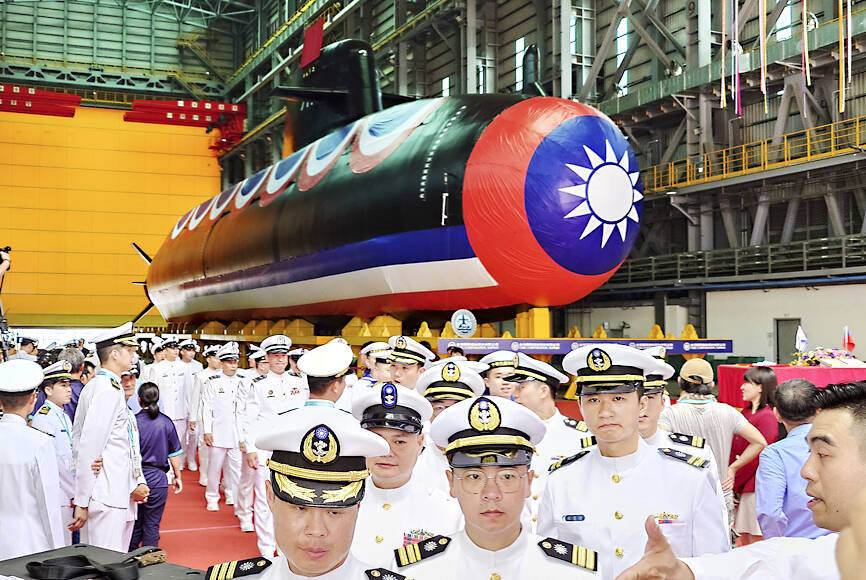Taiwan’s first indigenous defense submarine prototype, the Hai Kun (海鯤, SS-711), is undergoing a harbor acceptance test, a navy official said yesterday.
Admiral Huang Shu-kuang (黃曙光), who heads the Indigenous Defense Submarine program, said that personnel are training on the Hai Kun’s systems and equipment, and the next step would be a sea acceptance test (SAT) in the second quarter of next year.
The submarine was initially launched on Sept. 28, after seven years in development, he said, adding that the program has been supervised and audited by the Legislative Yuan, the Control Yuan and other government agencies, and no problems have been found.

Photo: Chiang Ying-ying, AP
Before the SAT, officials would thoroughly test all of the Hai Kun’s equipment and systems to ensure it operates within specifications, he said.
Rumors that the SAT would be conducted in the first quarter owing to progress on the harbor acceptance test were untrue, a source speaking on condition of anonymity said, adding that the tests would proceed according to the original schedule.
The Hai Kun has already passed inspections of its welds and watertight components, the source said.
The submarine’s development has become an election issue, with opposition candidates saying they would investigate people involved in the program over allegations they leaked information to China.
Huang has concerns about the program, and during a recent interview with the Nikkei newspaper, he said the program has received affirmation from US defense analyst H.I. Sutton, as well as Kazuki Yano, a former submarine fleet commander in the Japan Maritime Self-Defense Force.
Commenting on the Hai Kun’s NT$49.3 billion (US$1.58 billion) price tag, Huang said that the need to cooperate with international contractors for some components that Taiwan does not make contributed to the submarine’s cost.
In terms of domestic expenses, the cost included the construction of five workshops that made parts for the vessel, the purchase of automatic plate rolling machines, automatic welding machines, pipe bending machines and precision drilling machines, as well as two storage facilities for spare components, he said.
The amount also included labor, domestic and foreign materiel, and consultation fees for shipyard construction and naval technical assistance.
Citing an example of foreign procurements for the submarine, Huang said the US supplied 18 MK-48 torpedoes and spare parts.
Foreign procurements accounted for 60 percent of the submarine’s total costs, he said.
“The program was carried out in accordance with the laws, and was subjected to five special reports and on-site inspections by the Legislative Yuan,” he said. “The Control Yuan also conducted three special reports, and the National Audit Office conducted three financial audits.”

INVESTIGATION: The case is the latest instance of a DPP figure being implicated in an espionage network accused of allegedly leaking information to Chinese intelligence Democratic Progressive Party (DPP) member Ho Jen-chieh (何仁傑) was detained and held incommunicado yesterday on suspicion of spying for China during his tenure as assistant to then-minister of foreign affairs Joseph Wu (吳釗燮). The Taipei District Prosecutors’ Office said Ho was implicated during its investigation into alleged spying activities by former Presidential Office consultant Wu Shang-yu (吳尚雨). Prosecutors said there is reason to believe Ho breached the National Security Act (國家安全法) by leaking classified Ministry of Foreign Affairs information to Chinese intelligence. Following interrogation, prosecutors petitioned the Taipei District Court to detain Ho, citing concerns over potential collusion or tampering of evidence. The

‘FORM OF PROTEST’: The German Institute Taipei said it was ‘shocked’ to see Nazi symbolism used in connection with political aims as it condemned the incident Sung Chien-liang (宋建樑), who led efforts to recall Democratic Progressive Party (DPP) Legislator Lee Kun-cheng (李坤城), was released on bail of NT$80,000 yesterday amid an outcry over a Nazi armband he wore to questioning the night before. Sung arrived at the New Taipei City District Prosecutors’ Office for questioning in a recall petition forgery case on Tuesday night wearing a red armband bearing a swastika, carrying a copy of Adolf Hitler’s Mein Kampf and giving a Nazi salute. Sung left the building at 1:15am without the armband and apparently covering the book with a coat. This is a serious international scandal and Chinese

Seventy percent of middle and elementary schools now conduct English classes entirely in English, the Ministry of Education said, as it encourages schools nationwide to adopt this practice Minister of Education (MOE) Cheng Ying-yao (鄭英耀) is scheduled to present a report on the government’s bilingual education policy to the Legislative Yuan’s Education and Culture Committee today. The report would outline strategies aimed at expanding access to education, reducing regional disparities and improving talent cultivation. Implementation of bilingual education policies has varied across local governments, occasionally drawing public criticism. For example, some schools have required teachers of non-English subjects to pass English proficiency

TRADE: The premier pledged safeguards on ‘Made in Taiwan’ labeling, anti-dumping measures and stricter export controls to strengthen its position in trade talks Products labeled “made in Taiwan” must be genuinely made in Taiwan, Premier Cho Jung-tai (卓榮泰) said yesterday, vowing to enforce strict safeguards against “origin laundering” and initiate anti-dumping investigations to prevent China dumping its products in Taiwan. Cho made the remarks in a discussion session with representatives from industries in Kaohsiung. In response to the US government’s recent announcement of “reciprocal” tariffs on its trading partners, President William Lai (賴清德) and Cho last week began a series of consultations with industry leaders nationwide to gather feedback and address concerns. Taiwanese and US officials held a videoconference on Friday evening to discuss the